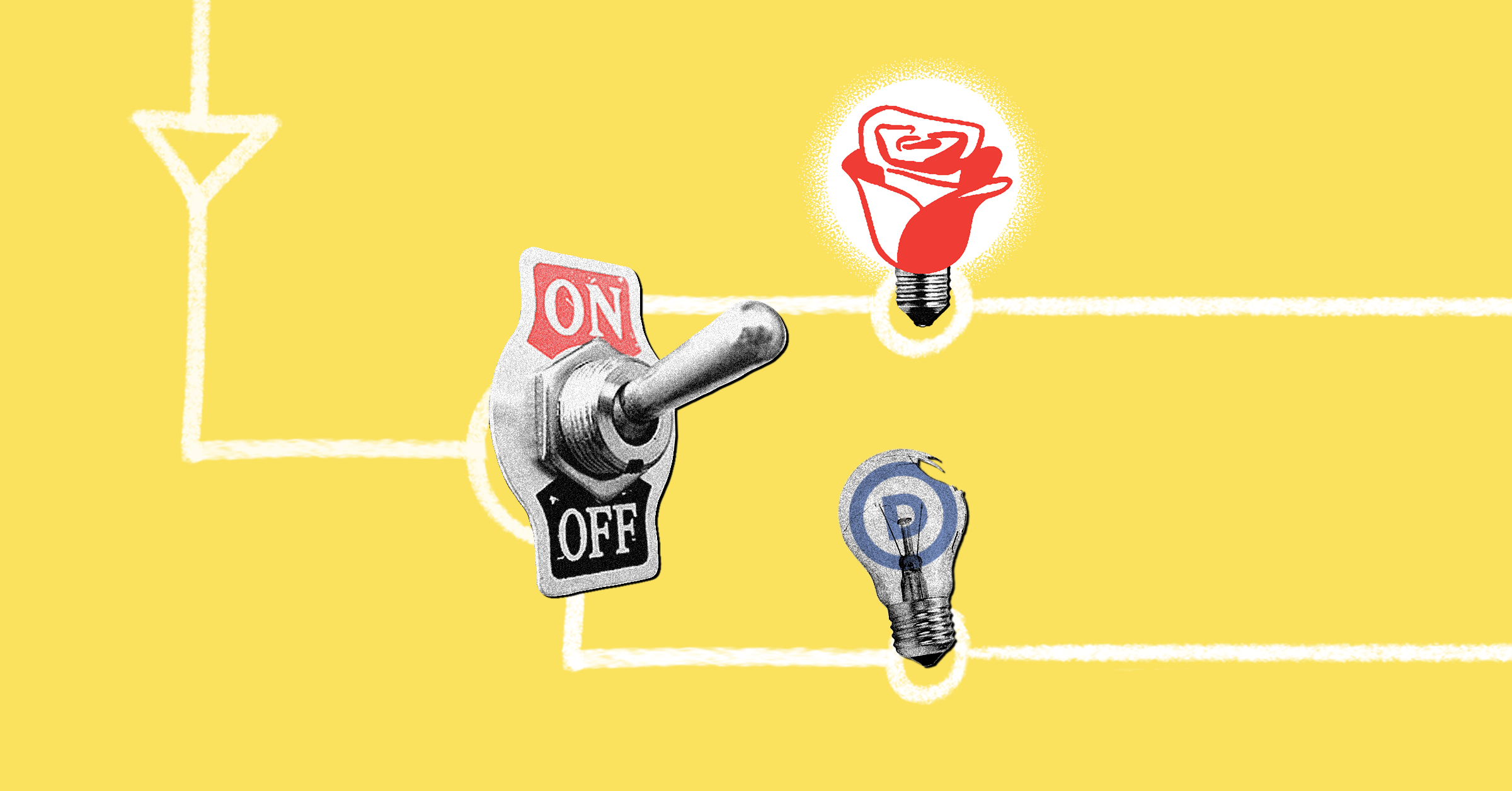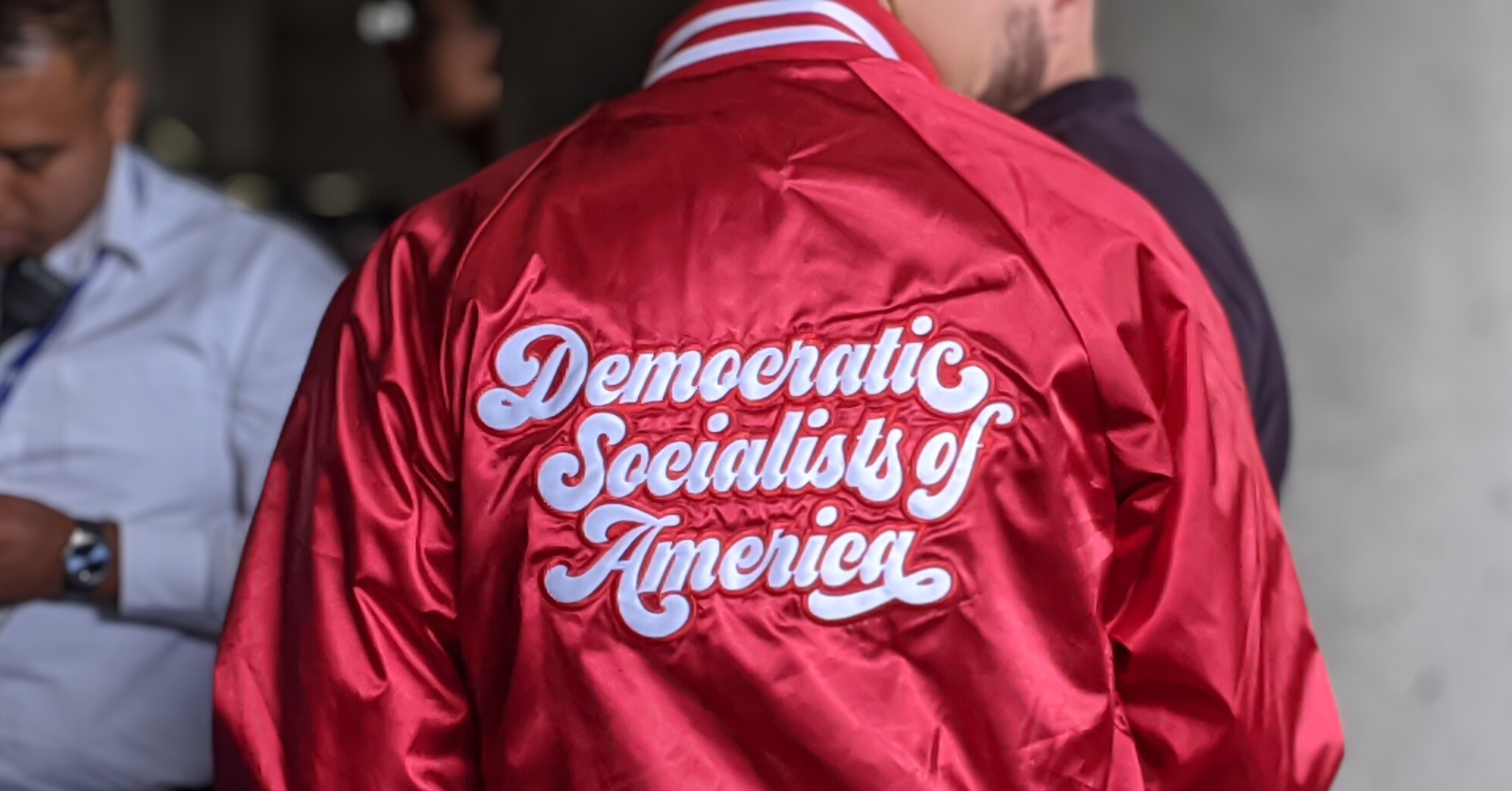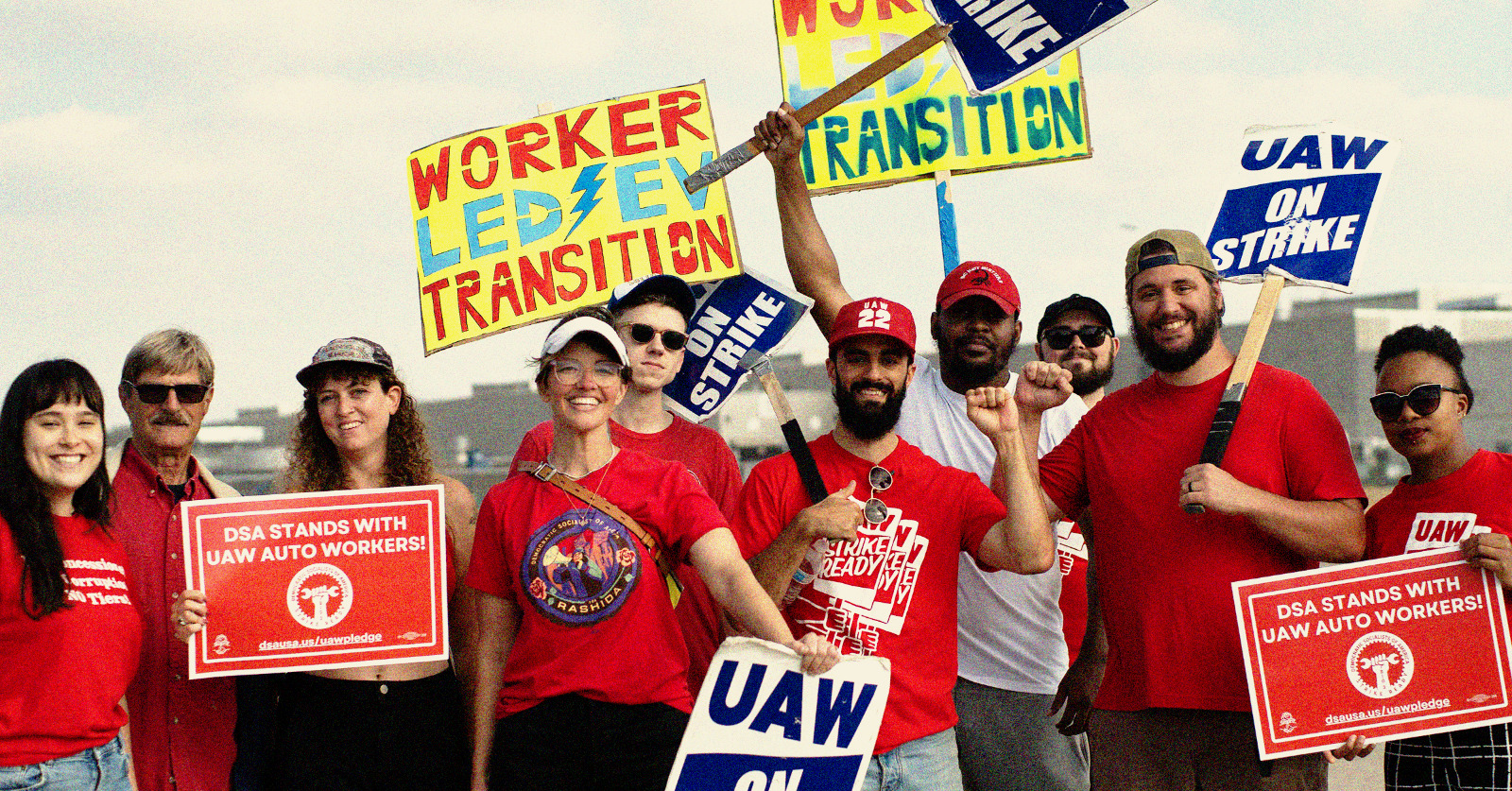In June, DSA’s Bread & Roses caucus voted on whether or not it would support Amendment #5 to Resolution #8: Toward a Mass Party in the United States at DSA’s 2021 National Convention. The amendment would recommit DSA to the position it took at the 2019 National Convention supporting an eventual split from the Democratic Party. It also recommends a variety of concrete steps the organization could take to build towards that split. In the vote, 55% of caucus members supported the amendment and 45% opposed. Given the close nature of the vote, Bread & Roses’s national leadership decided not to formally support the amendment as a caucus. Members of the caucus will support or oppose the resolution as they see fit. As part of the pre-convention debate, we at The Call are posting arguments for and against the amendment. The case for the amendment is presented here. The case against the amendment is presented in an article by Eric Blanc.
Democratic socialists want a society in which everyone has an equal say in the major decisions affecting their lives, in which resources are used to serve public needs and promote the flourishing of all. That requires breaking with the capitalist system, in which a wealthy few wield power over the rest of us and brutally exploit workers for their own benefit.
While workers have the interest and the potential power to transform society through class struggle, the working class doesn’t automatically adopt socialist ideas or fight back against capitalists. The U.S. working class today, while as exploited and oppressed as ever, for the most part does not yet have the class consciousness or confidence required to fight for social transformation, or even to collectively defend their immediate interests. A small minority of workers identify as socialists, and many reject unions. As Marx put it, a class in itself is not necessarily a class for itself — a class aware of itself as having an interest in overthrowing capitalism, and willing and able to fight for that goal.
In the past, workers have come to think and act as a class thanks, in large part, to a fighting labor movement and mass workers’ parties. While the Socialist and Communist parties of the early 20th century were substantial, the United States has never really had this kind of party. This partly explains the sorry state of our society compared with those of other advanced capitalist democracies (including our lack of a public healthcare system). We need to build such a party if we want to win major reforms like Medicare for All and a Green New Deal — let alone break with capitalism.
What we need is not just a party with a left-wing program. To build class consciousness, organization, and militancy, workers need a class party: a party of and for the working class, with no substantial involvement by capitalists or their political representatives. We need working-class people to be able to easily distinguish our candidates from mainstream conservatives and liberals, and to come to see themselves engaged in politics as workers. But building a working-class political identity won’t be possible so long as democratic socialists continue to identify as Democrats — a big tent which includes corporate politicians like Krysten Sinema, Joe Manchin, and Joe Biden. That’s why a workers’ party will eventually need its own ballot line.
The Democratic Party Will Not Be a Workers’ Party
DSA’s National Electoral Committee has put forward, for debate at our 2021 national convention, Resolution #8, “Toward a Mass Party in the United States.” This resolution reflects the agreement of various tendencies within DSA that we should build a mass workers’ party.
But resolution #8 is silent on important long-term questions about how we’ll build a workers’ party. In particular, the resolution leaves open whether we’ll get to a party by taking over the Democratic Party, forming our own party, or permanently coexisting on the same ballot line with capitalist politicians.
Past efforts at “realigning” the Democrats have failed, of course. But reflection on the nature of our electoral system and the nature of the Democratic Party suggest future attempts are also doomed. The party isn’t internally democratic, with a membership who can vote on policies, programs, and a leadership to carry it out. Instead, major donors, corporate media, and pro-capitalist liberal politicians effectively control the party. Ordinary people can somewhat influence the party by voting in primaries. But party elites and their allies in the media often put their thumbs on the scale in these contests. They have even declared support for overturning the popular will in the presidential primary if things don’t go their way. And despite Democratic voters’ strong support for policies like single-payer healthcare and free public college, party elites have no interest in pushing for these demands.
Moreover, while a few progressive or socialist candidates might use Democratic primaries to more easily win office now in some major cities, it is likely that the party establishment will co-opt many of our candidates, as often happens to left-wing challengers. But if socialists are able to pose a serious threat to party elites, there’s every reason to think they would simply change the rules to make running in Democratic primaries difficult or impossible. (They could do this, for instance, by banning socialists from accessing NGP VAN or changing primary rules to shut out members of DSA or other left groups.)
Meanwhile, our time spent running as the “good Democrats” does little to differentiate us from the corporate mainstream in the eyes of most voters. Instead, the Democratic Party is able to present itself as the representatives of the Left and the labor movement while spending much of its political and financial capital fighting left-wing policies and movements.
If we’re ever going to have a mass workers’ party, then in the long term we’ll most likely need (or be forced) to break from the Democrats. The alternative is to remain a junior partner in the Democratic coalition, the worst of all worlds. On the one hand, the Left’s demands will continue to be ignored or suppressed by the Democratic establishment. On the other hand, we will be forced to absorb the stink of the neoliberal party brand. This means socialists will make little progress in raising workers’ awareness of their fundamental conflicts of interest with the political party backed by bosses, landlords, and insurance companies.
The Importance of Conscious Preparation
Some comrades agree that we’ll probably need to split with the Democrats, eventually. But they reject the idea that we should prepare for that now. They say it’s better to focus on contesting Democratic primaries and building up the ability of DSA chapters to run their own candidates. We can worry about splitting from the Democratic Party later, if we even need to.
We should indeed keep building up DSA’s electoral infrastructure across the country, and running as Democrats where the partisan primary system makes it difficult or impossible to win elections otherwise. (This doesn’t include many municipal races, nor does it include any elections in California, our country’s biggest state; it uses “jungle primaries,” in which all parties’ candidates compete in one primary and the top two vote-getters proceed to the general election.) But we also need to consciously prepare and agitate for an independent workers’ party. If we don’t consciously and publicly prepare to form such a party, it’s not going to happen.
Political parties don’t emerge spontaneously. They are the result of deliberate persuasion, education, and organization. This is especially so when it comes to parties which challenge the status quo of capitalist dominance. It is much easier for workers to attempt to advance their interests through existing trade unions and political institutions. That’s why workers’ parties have historically emerged as the result of years or decades of conscious organizing on the part of socialist militants.
Many socialists argue that we can build towards a party now without taking a stance on whether we will break with the Democrats. We can build a “party surrogate” within the Democratic Party that will perform many of the functions of a party while our candidates continue to run as Democrats. Eventually, perhaps, our party surrogate will split from the Democrats; maybe it will become strong enough to take over the Democratic Party. Right now, they argue, we can afford to remain agnostic over the end result.
In most areas of the country, the party surrogate approach is the most promising strategy in the short term. But there are dangers in remaining agnostic about reforming the Democrats or trying to keep the “surrogate” going indefinitely. On the one hand, working within the Democratic Party without clarity on long-term strategy will likely push us towards accommodation to the party establishment and elite-driven “politics as usual.” Jane Slaughter puts the point well:
If you think it is possible capitalists would abandon the Democratic Party… your guiding star is likely to become an internal takeover. Hey, turns out it’s easy to become a precinct delegate! Isn’t this what the Tea Party did? It worked for the Republicans. If we can get on Committee X we can change Rule Y, which will help Candidate Z. All this time we’re interfacing with party elites and their loyal activists, rather than with members of the working class we might win over.
In short, the gravitational pull of the status quo is likely to pull “agnostic” activists back towards fruitless internal DP activism and attempts at taking over the party. And it risks inculcating the view that socialist and corporate politicians in the same party are part of the same family — a family that just has some internal squabbles — dampening the independence socialists need to fight for workers’ interests.
Remaining agnostic on whether we can take over the Democratic Party is also setting socialists up for confusion and disorientation in the future, in the very likely event that the Democrats try to push us out. If we haven’t educated and organized our people to form our own party, then expulsion from the Democratic fold will present our candidates and activists with an unfortunate dilemma. Either we moderate our politics, perhaps giving up our identification as socialists and our commitment to fighting for transformative reforms, in order to continue running as Democrats. Or we venture out into the political wilderness, without having prepared intellectually or organizationally to run candidates on our own.
Far better to start building our own party now.
A Very Brief History of the “Dirty Break”
History provides useful examples of socialists and labor activists working within capitalist-dominated political parties, eventually building their strength to the point where they could form independent workers’ parties. These examples suggest the importance of keeping our eyes on the prize of an independent party.
Minnesota socialists and populists formed the farmer-based Nonpartisan League (NPL) in 1915, which decided to run their own candidates in Democratic and Republican primaries. In the cities, socialists and labor unions allied in the Working People’s Nonpartisan League (WPNPL) in 1919. In the 1920 elections, the NPL contested Republican and Democratic primaries; where they lost, they ran as independents in the general election. Meanwhile, in urban areas, the WPNPL ran an independent slate of “Labor Candidates.”
Eventually, changes to election law by the Republican-controlled state legislature and internal debates within the leagues led the NPL and WPNPL to form the Minnesota Farmer-Labor Party (FLP), which ran candidates exclusively on its own ballot line. (WPNPL founder and socialist William Mahoney was clear that this was the goal all along.) The FLP went on to become one of the two dominant parties in Minnesota for over two decades.
In the U.K., socialists and labor militants ran candidates both in and outside the Liberal Party for decades (then one of the country’s two major parties) before founding the Labour Party. They were forced to do so because the U.K., like the U.S., has a “first-past-the-post” electoral system, which encourages “lesser evil” voting and makes it especially hard for third-party candidates to win. Through running candidates as both Liberals and independents, socialists and their trade-union allies became strong enough to form their own party and overtake the Liberals as the main opposition to the Tories.
These examples reinforce the importance of tactical flexibility and the value of running left candidates in capitalist parties. But we should note that, in both cases, many of the socialists involved were also running independent candidates and working to form their own parties for years or decades before the final “dirty breaks” with the capitalist parties.
This should come as no surprise. How could anyone pull off something like creating a new mass party without consciously striving to do so? Accomplishments like that don’t fall out of the sky. Let’s learn from history: we can keep building up our forces by running candidates as Democrats while also laying the groundwork for an independent workers’ party.
Why DSA Members Should Support Amendment #5
Socialists are trying to birth a new world from the ashes of the old. It only makes sense that we have a long-term strategy to achieve our goals. And long-term strategy should in turn inform our tactics in the short term.
That’s why other B&R comrades and I have proposed amendment #5 to resolution #8. The amendment reaffirms DSA’s commitment to eventually building a workers’ party independent of capitalists and the Democratic Party. It also makes a number of tactical prescriptions and suggestions to help us move toward that goal starting now. The amendment encourages nationally endorsed candidates to build independent organizations and political identity (for instance, by publicly identifying as democratic socialists and forming socialist legislative caucuses). It also calls on DSA to take steps to develop and build out our independent electoral operations and infrastructure, such as by providing training and resources for chapters on how to run class-struggle campaigns. Finally, the amendment commits DSA to fighting for reforms to democratize the US electoral system, in order to make large-scale socialist electoral success feasible.
Bread and Roses supports resolution #8, which represents the emerging consensus in DSA that we need a mass workers’ party. This consensus is vital to the success of the socialist project moving forward and worth celebrating.
But we should also accept that the Democratic Party will never be the party the working class needs. We need a party of our own, and we should start down the path to winning one now. I urge all DSA members to vote YES on amendment #5.




